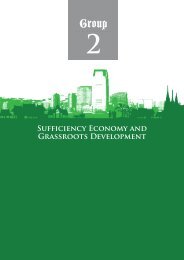Conflict, Legitimacy and Government Reform: Equitable Allocation of ...
Conflict, Legitimacy and Government Reform: Equitable Allocation of ...
Conflict, Legitimacy and Government Reform: Equitable Allocation of ...
You also want an ePaper? Increase the reach of your titles
YUMPU automatically turns print PDFs into web optimized ePapers that Google loves.
Panel Discussion<br />
I would like to divide my speech into four parts. The first part<br />
elaborates about inequality in the Thai society. The second part answers<br />
the question why modern-day Thai governments have not tried to<br />
mitigate these inequality. The third part analyzes situations in other<br />
countries that successfully mitigated inequality, so we know how they did<br />
it. I’ll focus on their fiscal policies 1 compared to Thail<strong>and</strong> <strong>and</strong> analyze<br />
what Thail<strong>and</strong> should do. The fourth part is the last part that analyzes<br />
why we should uphold a democratic parliamentary system as a<br />
mechanism that will eventually lead us to an acceptable fair society.<br />
What is the degree <strong>of</strong> inequality<br />
in the Thai society?<br />
Inequality appears in many forms. It may be economic, social,<br />
political <strong>and</strong> cultural status. Even language use <strong>and</strong> treatment may<br />
display inequality. The language we use conveys inequality all the time.<br />
We can look at the use <strong>of</strong> pronouns <strong>and</strong> words that display inequality.<br />
Generally, we tend to take them for granted. My speech today will focus<br />
on economic inequality which we can take the reading from statistical<br />
information to learn how income <strong>and</strong> wealth disparity are among various<br />
groups <strong>of</strong> people in the society. Income inequality indicates how much<br />
st<strong>and</strong>ards <strong>of</strong> living differ. If we want to see genuine affluence, we mainly<br />
look at wealth or ownership <strong>of</strong> properties.<br />
Wealth: Recently, TDRI revealed data on property ownership <strong>of</strong><br />
various groups <strong>of</strong> Thai families from the poorest 20% to the richest 20%<br />
as shown in Table 1. These data tell us that the richest families 20% <strong>of</strong><br />
the country collectively possess 69 per cent <strong>of</strong> the properties in the whole<br />
country while the poorest families 20% collectively possess only 1 per<br />
1 There is much more to resource management <strong>of</strong> the country for mitigation <strong>of</strong><br />
inequality than fiscal policies. In particular, there is much more to revenue generation <strong>of</strong><br />
the state sector for public spending than taxation. Aside from that, there are also issues<br />
concerning state enterprise management, l<strong>and</strong> management <strong>and</strong> management <strong>of</strong> other<br />
public properties. Due to limited time, overview <strong>of</strong> taxation policy <strong>and</strong> state expenditure<br />
will be highlighted.<br />
39














